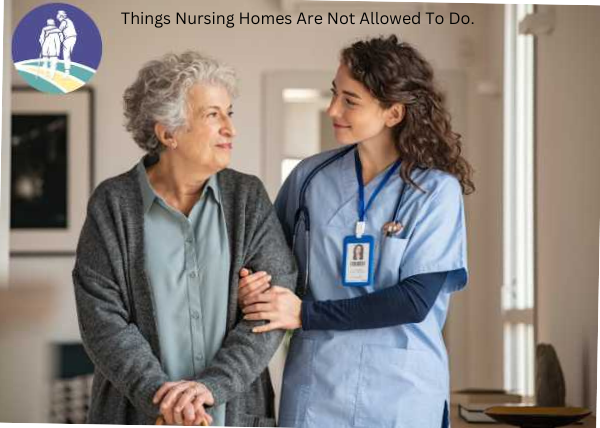Things Nursing Homes Are Not Allowed To Do:
Things Nursing Homes Are Not Allowed To Do This is a crucial query. Individuals living in assisted living facilities are in vulnerable situations. Numerous residents require continuous or frequent personal or nursing care. For instance, while some disabled people only require assistance with everyday living tasks, some chronically ill residents require full-time medical care.
State and federal laws protect the care provided to residents of nursing homes. But part of being able to safeguard yourself or your loved one while residing in a nursing home is understanding what these establishments are not permitted to do and what to do in the event that a violation takes place.
For elderly people in need of assistance with everyday duties and medical requirements, senior care services are indispensable. There are guidelines to abide by in order to keep everyone secure and content, just like in any family.
Regulations Dictate Things Nursing Homes Are Not Allowed to Do:

Departments of social services or health are in charge of licensing and overseeing nursing homes under their purview at the state level. They look into complaints or allegations of abuse or neglect and perform routine inspections to evaluate compliance with regulations. In addition, state agencies are essential in setting and enforcing regulations concerning resident rights, staffing ratios, medicine administration, infection control, and other vital aspects of care. By following these rules, nursing homes can guarantee that their residents live in a secure and safe environment that enhances their quality of life.
The Centers for Medicare and Medicaid Services (CMS) is the federal agency responsible for managing nursing homes that take part in the Medicare and Medicaid programs. Nursing homes must comply with the requirements outlined by CMS in the Code of Federal Regulations (CFR) in order to be eligible for reimbursement under these programs. Numerous facets of care are covered by these regulations, such as staff training, quality assurance, care planning, and resident assessments. In order to evaluate adherence to federal regulations, CMS carries out surveys and inspections. If non-compliance is found, sanctions or penalties are applied. The federal government is essential in guaranteeing the security and welfare of nursing home residents across the country by collaborating with state agencies.
There are specific things that nursing homes are not allowed to do, as outlined in state and federal regulations.
Forcible Medical Care:
Patients in nursing homes have the right to refuse service even though many of them frequently need additional medical attention. They also possess the right to visit a physician outside of their assisted living facility.
Mistreat Their Inhabitants:
Abuse of any kind, whether verbal, physical, or emotional, is illegal. Any indications of abuse should be reported right away.
Refuse to Receive Visitors:
During regular business hours, nursing homes are not allowed to refuse visitors access to their facilities. Even though access may be restricted during odd hours, it should raise red flags if a facility consistently refuses admission during business hours. erly people receive the respect and care they are due.
Abuse and Neglect:
It is forbidden for nursing homes to mistreat or abuse their residents in any way. This covers financial, sexual, emotional, and physical abuse. A resident may be neglected if they are not given proper food, medical attention, or attention to their personal hygiene needs. Any form of abuse infringes upon residents’ fundamental rights and has the potential to cause serious physical and psychological harm.
Mishandling of Medication:
Medication management and administration for residents’ prescriptions must be done correctly in nursing homes. Employees are not permitted to give medication without a doctor’s prescription or the appropriate authorization. They should also refrain from depriving patients of their medication as a kind of coercion or punishment. The health and wellbeing of inhabitants may suffer significantly if pharmaceuticals are not handled properly.
Privacy Violation:
It is the right of nursing home residents to have their personal information and medical records kept private and confidential. Sensitive information about residents cannot be disclosed by nursing homes to uninvited parties or organizations. Furthermore, staff members should always respect residents’ autonomy and dignity, allowing them to remain private in their living areas and when receiving personal care.
Moderation And Isolation:
Seclusion or physical restraints are strictly regulated methods of behavior control for residents, and they should only be used as a last resort in situations where the resident’s safety is at risk. Before applying any kind of restraint or other form of control, nursing homes must get the informed consent of residents or their legal representatives.
Refuse to Provide You with Social Services:
All assisted living facilities are required to offer their residents social services like counseling, resolving conflicts with other residents, obtaining outside assistance from a lawyer or physician, and discharge planning.
impede your ability to leave the assisted living facility:
It is possible for residents to vacate the facility at any point. If they are able to do so and are under sufficient supervision outside the facility, they also have the right to spend time there.
In conclusion:
By being aware of your loved one’s rights, you can make sure that any warning signs or red flags are identified early on. It is imperative that you seek legal counsel if your nursing home facility has broken any of the aforementioned regulations.
for more information visit our Homepage






